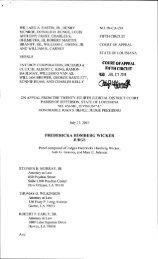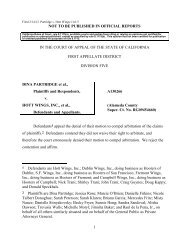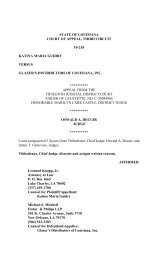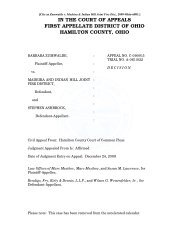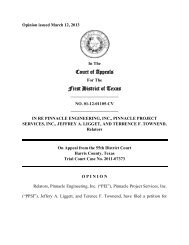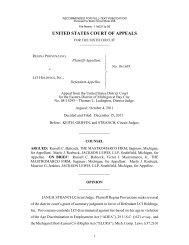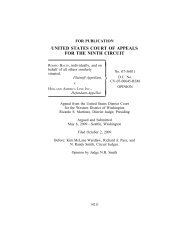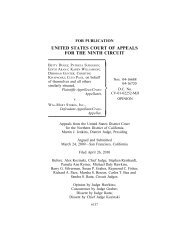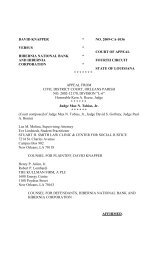STATE OF MINNESOTA IN COURT OF APPEALS A10 ... - LawMemo
STATE OF MINNESOTA IN COURT OF APPEALS A10 ... - LawMemo
STATE OF MINNESOTA IN COURT OF APPEALS A10 ... - LawMemo
Create successful ePaper yourself
Turn your PDF publications into a flip-book with our unique Google optimized e-Paper software.
are determinative, rather than either party's subjective intent.”). Here, the record is<br />
devoid of any evidence that Jennie-O offered to pay appellants for time spent donning<br />
and doffing. 1 To the contrary, appellants have either conceded that they never discussed<br />
with respondents whether they could be paid for donning and doffing or admitted that<br />
they cannot recall any such discussions. Appellants attempt to rely on provisions in<br />
employee handbooks as reflecting an agreement to pay for donning and doffing, but fail<br />
to cite any language identifying such a promise. 2 Appellants assert that the dearth of<br />
evidence demonstrates the existence of a genuine issue of material fact to be decided by<br />
the jury. But we conclude that, on this record, no reasonable jury could find that the<br />
parties reached an agreement that appellants would be paid for donning and doffing.<br />
Appellants assert that such a conclusion leaves undefined a term of the contract<br />
necessary to its operation, i.e., the “work” to be compensated. In so arguing, appellants<br />
rely on § 204 of the Restatement (2d) of Contracts, which allows the court to supply a<br />
missing, necessary term that is “reasonable in the circumstances.” The Second<br />
1 Appellants assert that the district court erred by placing on them the burden of<br />
proving the terms of their oral employment agreements, relying on Minn. Stat. § 181.56<br />
(2010) for the proposition that the employer has the burden to prove employment terms.<br />
We agree with respondents that section 181.56 must be read in connection with Minn.<br />
Stat. § 181.55 (2010), which requires written notice of certain employment terms not at<br />
issue here. Moreover, appellants indisputably do have the burden to “present specific<br />
facts showing that there is a genuine issue for trial.” Minn. R. Civ. P. 56.05.<br />
2 The handbooks include disclaimers likely sufficient to preclude contract<br />
formation. See, e.g., Audette v. Northeast State Bank of Mpls., 436 N.W.2d 125, 127<br />
(Minn. App. 1989) (affirming summary-judgment dismissal of handbook-based contract<br />
claim because disclaimer language negated intent to form contract). But appellants<br />
purportedly rely on the handbook provisions as reflecting the terms of an earlier oral<br />
agreement, as opposed to creating contractual obligations in and of themselves.<br />
10



